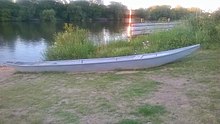Boat

A boat ( Old High German Nahho , Germanic Nakwa , Indo-European Nagua ) originally referred to a dugout canoe , a compact, flat boat or a barge for inland navigation .
In the river and floodplain landscapes of southern Germany, the fishing and ferry boats traditionally made of oak are also known as barges or barges. It is a small boat without superstructures, which is driven by muscle power (rowing or poking) and which is very similar to the Weidling . Alternative names for this southern German small barges are also three board or punt . Open boats made of other materials or with a different drive can also be used as fishing gear for the hobby angler or for the popular boat trips on the Old Rhine. Up until a few decades ago, there were only three-sided peaks on the Nette lakes .
Outside of the rivers and floodplains of southern Germany, the word Nachen is often only known from literature , especially poetry , mythology and the painting collections of art museums. Richard Wagner's Lohengrin , the rider from Lake Constance , the ferryman to the island of the dead and the Bavarian King Ludwig and many fairy tale characters used boats instead of profane ships , boats or barges .
Was traditionally and is east same , especially in the Havel country and in the former East Prussia for a small boat similar to the use of Nachens the term hand Kahn used. The painter Max Pechstein called one of his pictures Handkahn
Other boats (regionally different names):
- Kahn - flat, larger workboat, cargo ship, tugboat
- Pontoon - work, construction or army boat or raft
- Weidling - mainly fishing boat (made of willow wood)
- Bark - poetic, especially in the Mediterranean
- Zille - flat work boat, also used as a ferry
- Ledischiff or Nauen - Swiss name for a cargo ship
- Sloop - a dinghy for larger ships, harbor boat
- Close - especially in the 15th century were in Germany large, low-built ferries with little depth designated as such. The wooden vehicles used to translate animals and people were mainly used on the Rhine and Neckar .
Examples from the literature
- How the river moves in width and length / so many funny boats ... ( Johann Wolfgang von Goethe : Faust I , Vor dem Tor, line 931 ff.)
- In the beat of your heart my boat sways , / My heart weeps, and all the stars laugh. ( Heinrich Mann : Professor Unrat , Song of Rosa Fröhlich in Chapter 6)
- And don't cover it with the bark of ice / I speak, you stepped out of the boat . ( Gustav Schwab : Der Reiter und der Bodensee )
- A swan is pulling a boat over there! A knight stands erect in there! ( Richard Wagner : Lohengrin , 1st act, 2nd scene)
- And see! - Chasing a fairy, pulled by dragonflies, swimming upstream there. ( Joseph Viktor Widmann : Thun Sonata by Johannes Brahms , Textarchiv - Internet Archive )
- A little boat will probably lead to brooks and pools; but on ocean waves it would (must) crash. ( Wanders German Proverbs Lexicon )
- Herbert Stertz: Havel shipping under steam. Economic factor and experience . Media @ Vice, Pritzwalk 2006, ISBN 3-00-019924-1 , page 115 ff.
- Let's go happily in the boat / Heaven and earth laugh ( Giovanni Gastoldi : Amor Vittorioso (German text by Peter Cornelius ))
Web links
- Historical plans of a boat in the Ingolstadt City Archives
- Article on the history of Gimbsheim shows how boats were used as ferries and fishing boats in the 19th and early 20th centuries
- Documentary film about the construction of a three-sided river from 1979
Individual evidence
- ↑ Bild Handkahn by Max Pechstein at artnet.de; accessed on January 1, 2016